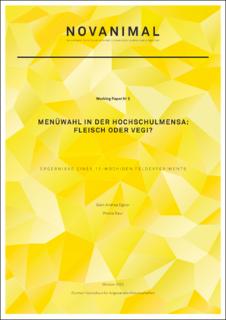Bitte benutzen Sie diese Kennung, um auf die Ressource zu verweisen:
https://doi.org/10.21256/zhaw-1405| Publikationstyp: | Working Paper – Gutachten – Studie |
| Titel: | Menüwahl in der Hochschulmensa : Fleisch oder Vegi? Ergebnisse eines 12-wöchigen Feldexperiments |
| Autor/-in: | Egeler, Gian-Andrea Baur, Priska |
| et. al: | No |
| DOI: | 10.21256/zhaw-1405 |
| Umfang: | 98 |
| Erscheinungsdatum: | Okt-2020 |
| Reihe: | NOVANIMAL Working Papers |
| Reihenzählung: | 5 |
| Verlag / Hrsg. Institution: | ZHAW Zürcher Hochschule für Angewandte Wissenschaften |
| Verlag / Hrsg. Institution: | Wädenswil |
| Sprache: | Deutsch |
| Schlagwörter: | Feldexperiment; Mensa; Gemeinschaftsgastronomie; Verpflegungstyp; Verpflegungsgewohnheit; Vegetarisch; Vegan; Fleischkonsum; Innovation; Ernährung; Flexitarier; Kassendaten; Reaktanz; Wahl Mittagessen; ABABAB-Umkehrdesign; Akzeptanz; Alter; Campuscard; Ernährungsgewohnheit; Flexitarier; Frauen und Männer; Geld; Geschlecht; Hochschulcampus; Intervention; Mensagänger; Menülinie; Menüwahl; Mittagsverpflegung; Ovo-lakto-vegetarisch; Praxispartner; Reallabor; Student; Studentin; SV Schweiz; Mitarbeiter; Mitarbeiterin; Transdisziplinäre Forschung; Vegan; Vegetarisch; Verpflegungsangebot; Flexitarisch; Kreativität |
| Fachgebiet (DDC): | 150: Psychologie 613.2: Diätetik |
| Zusammenfassung: | How do canteen visitors respond to a revised offer of meat-based and plant-based meals? Selected innovations were simultaneously implemented and tested in a transdisciplinary field experiment in two university canteens over a 12-week period in the autumn semester 2017. Throughout this time, the meat dishes and ‘veg-meals’ (ovo-lacto-vegetarian and vegan meals) were randomly distributed among the three menu lines, the veg-meals were not marketed and advertised as such and the previous vegetarian menu line was abolished. Weeks where the usual number of meat dishes were on offer (the ‘base weeks’) alternated with weeks where the share of veg-meals was increased (the ‘intervention weeks’). The field experiment did not have a negative impact on the number of meals sold or the turnover compared to the two previous years. Women choose meat dishes less often than men. This connection applies in the base weeks and intervention weeks, in all age groups, among both students and among staff. Remarkably, the share of (non-labelled) vegan dishes is comparable for women and men over all age groups, independent of university affiliation (student, staff). Authentic vegan dishes were particularly welcome. Veg-meals could also be sold on the more expensive menu line. There was a better correlation between meal choice, eating habits and attitudes (health, environment, animal welfare, social aspects) than expected. One quarter of canteen visitors show ‘veg-oriented’ eating habits and three quarters thereof ‘meat-oriented’ eating habits. Only a minority of potential visitors eat regularly at the canteen, and those who do exhibit meat-oriented eating habits more often. We conclude, therefore, that the canteen’s usual menu offer is primarily aimed at visitors with meat-oriented eating habits at lunchtime. The most typical visitors to the canteen are male students who select meat dishes. It has been shown, therefore, that the simultaneous changes in supply have worked. Veg-meals are preferred, particularly by women and those prone to flexitarian eating habits; however, also the canteen visitors with meat-oriented eating habits chose veg-meals during the intervention weeks. Catering in canteens has the great potential to expand the range of veg-meals at the expense of meat dishes, provided that the culinary quality is of a high enough standard and meals are not offered as vegetarian or vegan. The question arises as to whether canteens are not missing an economic opportunity if they only offer traditional meat dishes? Canteens are perfectly suited as real-world laboratories in which innovations for sustainable catering can be tried out. The field experiment in the two university canteens is a start; further experiments are needed. |
| URI: | https://digitalcollection.zhaw.ch/handle/11475/20783 |
| Lizenz (gemäss Verlagsvertrag): | CC BY 4.0: Namensnennung 4.0 International |
| Departement: | Life Sciences und Facility Management |
| Organisationseinheit: | Institut für Umwelt und Natürliche Ressourcen (IUNR) |
| Publiziert im Rahmen des ZHAW-Projekts: | NOVANIMAL Innovationen in der Ernährung |
| Enthalten in den Sammlungen: | Publikationen Life Sciences und Facility Management |
Dateien zu dieser Ressource:
| Datei | Beschreibung | Größe | Format | |
|---|---|---|---|---|
| 2020_Egeler-Baur_Menuwahl-Hochschulmensa_NOVANIMAL.pdf | 1.59 MB | Adobe PDF |  Öffnen/Anzeigen |
Zur Langanzeige
Egeler, G.-A., & Baur, P. (2020). Menüwahl in der Hochschulmensa : Fleisch oder Vegi? Ergebnisse eines 12-wöchigen Feldexperiments. ZHAW Zürcher Hochschule für Angewandte Wissenschaften. https://doi.org/10.21256/zhaw-1405
Egeler, G.-A. and Baur, P. (2020) Menüwahl in der Hochschulmensa : Fleisch oder Vegi? Ergebnisse eines 12-wöchigen Feldexperiments. Wädenswil: ZHAW Zürcher Hochschule für Angewandte Wissenschaften. Available at: https://doi.org/10.21256/zhaw-1405.
G.-A. Egeler and P. Baur, “Menüwahl in der Hochschulmensa : Fleisch oder Vegi? Ergebnisse eines 12-wöchigen Feldexperiments,” ZHAW Zürcher Hochschule für Angewandte Wissenschaften, Wädenswil, Oct. 2020. doi: 10.21256/zhaw-1405.
EGELER, Gian-Andrea und Priska BAUR, 2020. Menüwahl in der Hochschulmensa : Fleisch oder Vegi? Ergebnisse eines 12-wöchigen Feldexperiments. Wädenswil: ZHAW Zürcher Hochschule für Angewandte Wissenschaften
Egeler, Gian-Andrea, and Priska Baur. 2020. “Menüwahl in der Hochschulmensa : Fleisch oder Vegi? Ergebnisse eines 12-wöchigen Feldexperiments.” Wädenswil: ZHAW Zürcher Hochschule für Angewandte Wissenschaften. https://doi.org/10.21256/zhaw-1405.
Egeler, Gian-Andrea, and Priska Baur. Menüwahl in der Hochschulmensa : Fleisch oder Vegi? Ergebnisse eines 12-wöchigen Feldexperiments. ZHAW Zürcher Hochschule für Angewandte Wissenschaften, Oct. 2020, https://doi.org/10.21256/zhaw-1405.
Alle Ressourcen in diesem Repository sind urheberrechtlich geschützt, soweit nicht anderweitig angezeigt.